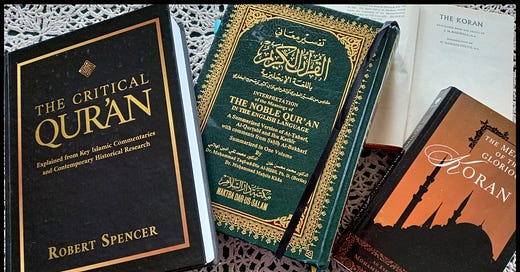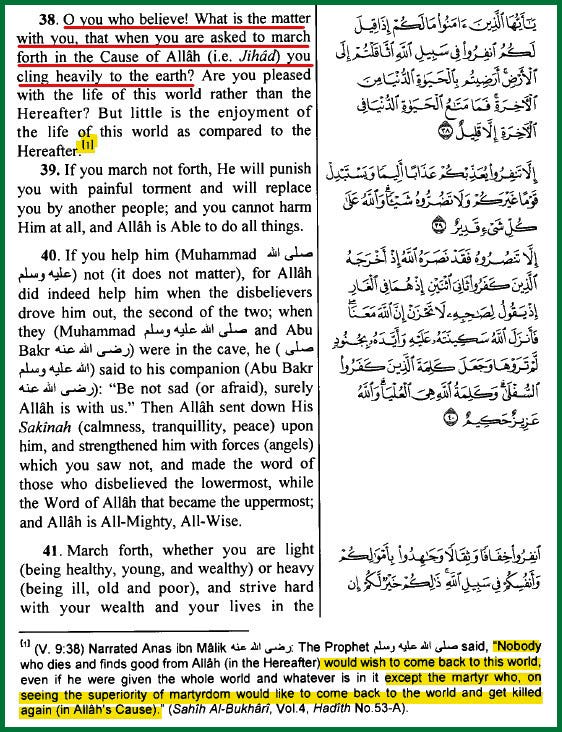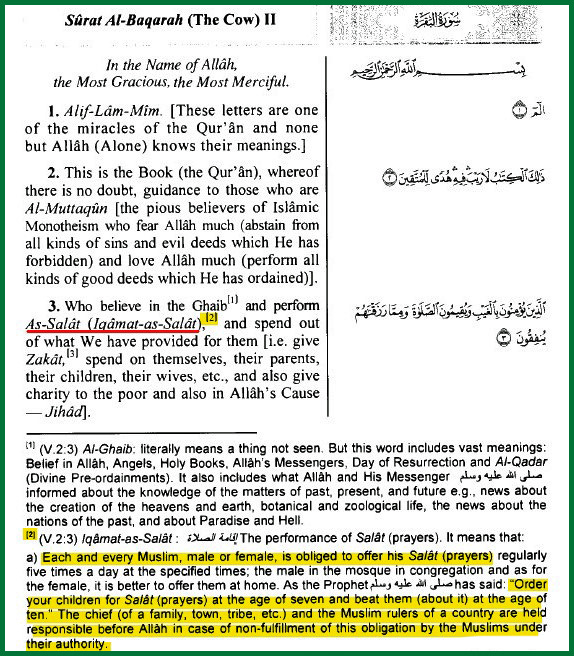Which Koran To Buy And Why!
With Islam spreading around the globe at a rapid pace and demands for sharia raising valid concerns in non-Islamic countries, it is wise to find out what it is all about. For that reason I recommend learning about the foundational doctrine from original sources and one way to do that is to purchase a Koran. As one author put it ‘Islam According To Muhammad, Not Your Neighbor’ [1].
Islamic doctrine is not just about Muslims, more than half the Koran addresses the non-Muslim and whether they realize it yet or not, they are affected by it. I own several Korans and did a great deal of research before buying the first one. When a law – sharia – affects you, it’s important to understand what that law says and when it comes to Islam, a Koran with commentary is especially helpful to understanding its meaning.
‘The Noble Qur’an’ Hilali/Khan translation is the most widely read, available in several languages, and includes commentary taken from the most esteemed early Islamic scholars and collectors of Hadith (such as Tabari, Ibn Kathir and Bukhari). That is why I chose it several years ago and read it through from beginning to end. It isn’t difficult, although it is extremely repetitive.
The Koran does reference stories found in the Bible from time to time but with significant differences. For example, in the Koran, Job struck his wife. Keep in mind that although the Koran is supposed to be the divine revelation of Allah transmitted by the angel Gabriel, every word in the Koran was uttered by Mohammed.
Another Koran with key commentary, recently published and based on the modernized Pickthall translation is ‘The Critical Qur’an’ by Robert Spencer. This is a quality translation designed for the English-speaking reader explaining those passages that are ‘most problematic for the non-Muslim’ such as ‘exhortations to jihad warfare’ and sharia provisions regarding women. This edition also includes contemporary historical research and an introduction that addresses some of the problems with the text – such as the canonical ordering of the texts from longest to shortest rather than chronologically. The only shortcoming in this Koran that I feel obliged to mention is that the publisher added the chapter name but not the number at the top of the pages. This is easily remedied with a pen and five minutes of your time to do it yourself.
Here are two examples of commentary so you can see why this would be of interest to both Muslim and non-Muslim alike:
The first example illustrates why non-Muslims may want to investigate what the Koran has to say about them, the second example illustrates why Islamic authorities may be anxious to exercise their authority by enforcing sharia.
Other quality translations include Yusef Ali, Marmaduke Pickthall and Sahih International. These, together with Hilali/Khan, the Hadith and a ‘Classic Manual of Islamic Law’ can all be found linked to the homepage of this website:
https://www.poi-nps.com/
Now many Islamic scholars do not like that the Koran is available to the non-Muslim at all [2].
“If a Koran is being purchased for someone, it is obligatory that the person be Muslim (0: The same is true of books of hadith and books containing the words and deeds of the early Muslims. "Koran" in this context means any work that contains some of the Koran, even a slight amount.)”
“When one fears …that a non-Muslim may touch it [the Koran], or that it may come into contact with some filth, then one must pick it up if there is no safe place for it…”
Similarly, Muslims have historically been accused of ‘kufr’ or disbelief for questioning the authority and interpretation of Imams, Mullahs and Sheikhs. Today, independent inquiry via on-line and other resources is harder to monitor in spite of rules to the contrary.
“…what befits the common people and vast majority of those learning or possessing Sacred Knowledge is to refrain from discussing the subtleties of scholastic theology, lest corruption difficult to eliminate find its way into their basic religious convictions.”[3]
Ignorance has never benefited any society, especially when it comes to understanding Islam. For instance, Al-Tabari provides an example from Persia during Umar's reign (635-636), when military expeditions were sent out to establish pacts aimed at collecting jizyah, or protection money. The doctrine would be given to them, but only after they converted to Islam [4].
[2239] The [Persian] king then said : "Ask them: 'Why did you come here ? What induced you to attack us and covet our country?
Did you muster courage against us because we left you alone and were busy with other matters?
[2240] "This is a bad thing, but not as bad as the alternative; if you refuse [to pay], it will be war. If you respond and embrace our religion, we shall leave with you the Book of God [Allah] and teach you its contents, provided that you will govern according to the laws included in it."
In the 21st century, we are fortunate to have an unprecedented opportunity to learn about Islam. Never before in its fourteen-century history has there been such a possibility to bypass traditional filters and access the source directly. I strongly encourage everyone to take advantage of this moment to become informed. And consider how lucky we are, for girls in Afghanistan, reading anything is just a dream.
SOURCES:
[1] Kirby, Dr. Stephen M. ‘Islam According To Muhammad, Not Your Neighbor’ CreateSpace Pub. 2014
[2] Sharia, ‘Reliance of the Traveller’ (e.83, k1.2(e)), Nuh Ha Mim Keller, Amana Publications 2015 https://archive.org/details/relianceofthetravellertheclassicmanualofislamicsacredlaw
[3] ibid. a4.2
[4] ‘The History of all-Tabari’ Vol. XII year 14: [2239] [2240], State University of New York Press, 1992
Images: ‘The Noble Koran, English Translation of the meanings and commentary’ Hilali/Khan ISBN 978-603-8095-74-4






